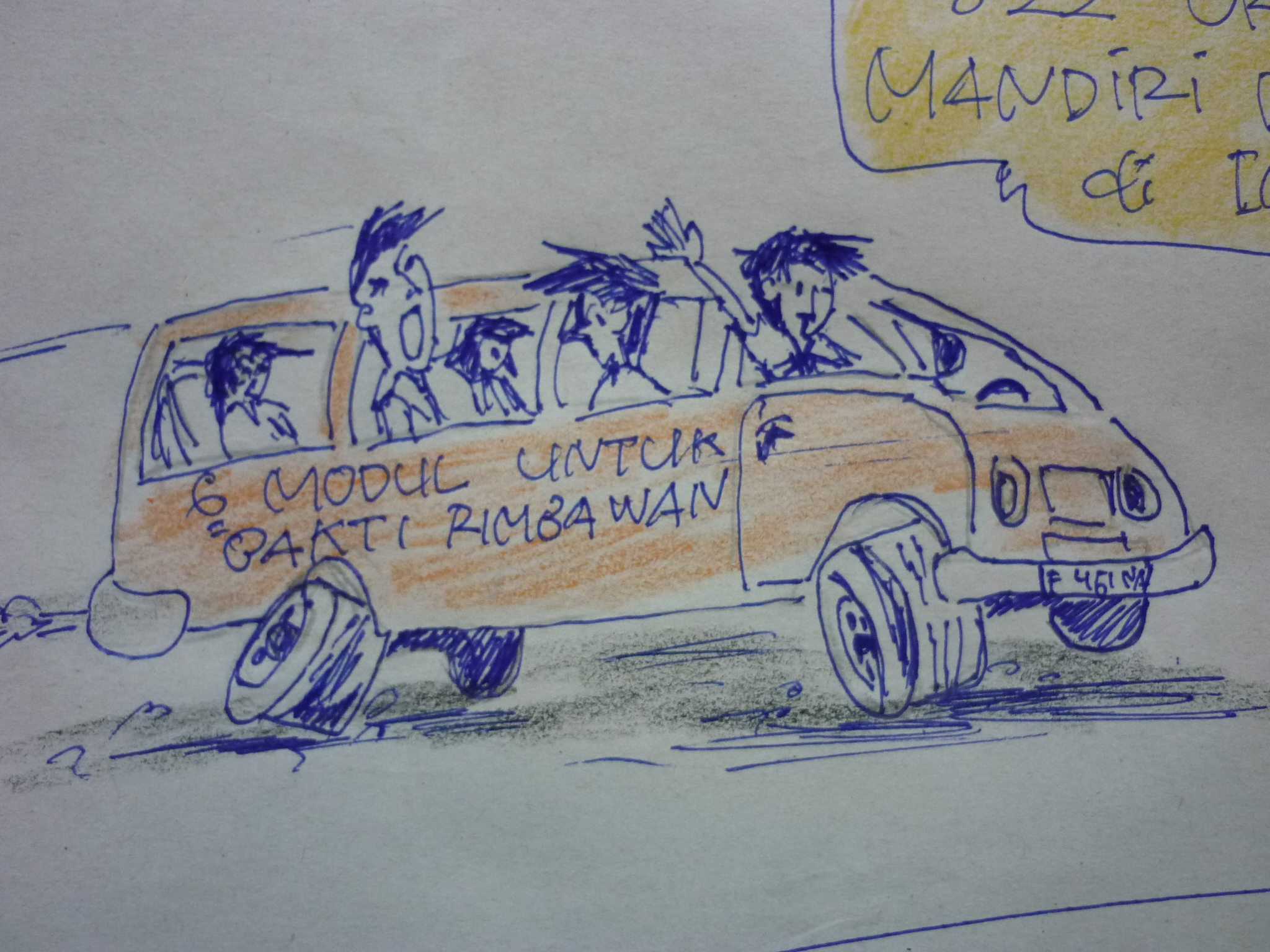Challenge to train 41,800 forestry staff – E-Learning as an answer?
The Center for Forestry Education and Training (CFET) of the Ministry of Environment and Forestry has the aim to train 41,800 people over the next five years. This number is three times higher than the one achieved within the last five years. One of the strategies to meet this objective is through the usage of E-Learning or Blended-Learning.
E-Learning is a self-directed or tutored learning process. The content is designed by using a software to insert photos, videos and audio fills to create an interesting learning experience. If it is provided by a CD-ROM or flash disc, E-Learning can be done off-line. No internet connection is necessary. E-Learning processes are more efficient, if learners collaborate online and are facilitated by trainers. Normally trainers support the learning process by using online chats or writing feedback with E-Mail. But if there are technical difficulties, it is also possible to use phone calls or sending SMS. Blended-Learning combines the outlined E-Learning with classical face-to-face trainings. This is often used to deepen the reflection by discussing the competencies gained online or offline.
E-Learning offers the possibility to conduct trainings for a high number of forestry personnel in remote areas. Therefore E-Learning can contribute to human capacity development to ensure dedicated and well trained forestry staff for Indonesian Forest Management Units, which can realize sustainable forest management, biodiversity conservation and livelihood improvement.
FORCLIME supports Implementation of E-Learning
Is E-Learning surely appropriate for the Centre for Forestry Education and Training (CFET) and its regional branchs? To answer this important question, a preliminary assessment of the e-learning readiness was conducted in September 2014. Through group discussions with the management and trainers, it became obvious that the Implementation of E-Learning is possible. It also been regarded as appropriate to increase quality of learning and quantity of trained forestry personnel. In a next step a E-Learning Discovery Workshop was necessary to join forces and to sharpen the vision for E-Learning within the CFET and the regional training centres. To gain clear inside into the implementation process, two training institutions from Ministry of Finance and Province East Java shared their experiences and challenges. Furthermore the State Administration Agency (LAN) was invited to give orientation about rules and regulations applied for E-learning activities of the trainers. It was guaranteed that the efforts of the trainers will be honoured likewise classical training development and facilitation. Another important topic of this workshop was the identification of a training for which E-Learning should be developed. It was jointly agreed that E-Learning will be developed to support the training of 822 new forestry personnel in March 2015.
With 3 content development workshops for about 30 trainers it was possible to reach the very challenging milestone in time. 822 new staff for Forest Management Units were able to learn with 6 Modules:
- Introduction into “Forest Management Unit” (FMU)
- Management of Collaboration within FMU
- Facilitation technique for Communication and Collaboration within FMU
- Entrepreneurship in FMU
- Analysis of non-timber forest products for economic empowerment in FMU
- Introduction into the usage of GPS in FMU
For a look into the modules, please visit: pusdiklathut.org/baktirimbawan
Findings of the Evaluation
The participants were asked to give feedback to gain inside into the benefits and challenges of the provided 6 E-Learning modules. The modules got top marks from the learners. In average 1/3 of the participants said, that the modules are very interesting, varying from module to module from 55 to 70 Percent. 2/3 of the participants reported, that the modules are interesting, varying from module to module from 25 to 37 Percent. Interestingly 39 Percent of the participants reported, that a lot of new learning content was provided by the E-Learning Modules. “Management of Collaboration within FMU” for example, was one of the modules, which provided mostly new content for nearly half of the participants (45 percent). As more than 2/3 of the participants (68 percent) summarize, that the E-Learning Modules are very helpful for their future work in the Forest Management Unit, it could be said, that the E-Learning was a great success. Thus, further efforts to implement E-Learning and Blended Learning within CFET, the regional training centers and also vocational highschools can be done with great motivation and spirit.
Outlook

The Implementation of E-Learning is to set up the Learning Management System (LMS) that has conducted in end of March 2015. During this meeting discussed how tasks and responsibilities will be organized within the Center of forestry education and training (CFET) and the regional training centers (BDK). The forestry vocational Highschools (SMKK) were invited to get insight into the possibilities of E-Learning and to reflect on their involvement. A very important goal of this event will be the Identification of future trainings, which are suitable as Blended-Learning trainings. Next to a Workshop to develop Blended Learning, several more Training of the trainers (ToT) will be offered. One ToT will support the trainers to gain competencies, how to facilitate learners in their E-Learning processes. Afterwards trainers and member of the E-Learning Team are competent to provide themselves Training for E-Learning/Blended Learning Development, ToTs for E-Learning Facilitation and Learning Management System (LMS) Trainings. By 2016 the Center of forestry Education and Training as well as the Regional Training centers are able to develop and conduct E-Learning successfully to strengthen Human Capacity Development of forestry staff in Indonesia and also in the ASEAN Region. These are important steps towards realization the vision being a center of Excellence for forestry training.
For further information, please contact:
Anne-Cathrin Vonarx, Adviser for Human Capacity Development
Edy Marbyanto, Strategic Area Manager for Human Capacity Development







